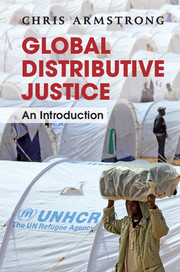Introduction
Published online by Cambridge University Press: 05 June 2012
Summary
Protests in favour of ‘global justice’ are becoming a familiar part of the political landscape. Placards demanding a more just, fair or equal world present a colourful accompaniment to every major meeting of world leaders. Social movement scholars are busily researching – and arguing about – whether a ‘global justice movement’ can be said to be emerging. There are also many organisations which campaign to try and raise awareness of global issues – such as Make Poverty History, Oxfam and the World Development Movement. And, sure enough, the idea of global justice is slowly creeping into the mainstream of political debate. When the leaders of the G8 wealthiest countries met at Gleneagles, Scotland, in 2005, they committed themselves to securing debt cancellation for the poorest countries, an additional US$50 billion in overseas aid and a (somewhat) more just system of international trade. Partly under pressure from organisations such as Make Poverty History, political leaders appeared to recognise that issues of global justice were going to be an important part of the political agenda for the twenty-first century.
But what is global justice, and what does it mean? Judging from the organisations and individuals who campaign about it, it incorporates issues such as global poverty, trade justice (and also fair trade), aid to the developing world, debt cancellation, and perhaps human rights too, as well as issues such as how to spread the costs of responding to climate change. But what, if anything, have these issues got in common? Broadly speaking, we can describe them as issues of distributive justice – that is, they concern how the benefits and burdens of living together are to be shared out between us. Advocates of global justice are arguing – typically, at least – for more equal access to international trade networks for poorer countries or the provision of more aid, or are arguing that people in wealthier countries ought to reduce their carbon emissions because they are, currently, disproportionately large. As issues of distributive justice these are normative concerns – they relate to what people ought to get (what they are morally entitled to), as well as what they ought to do, or give (what their moral duties are).
- Type
- Chapter
- Information
- Global Distributive JusticeAn Introduction, pp. 1 - 7Publisher: Cambridge University PressPrint publication year: 2012



